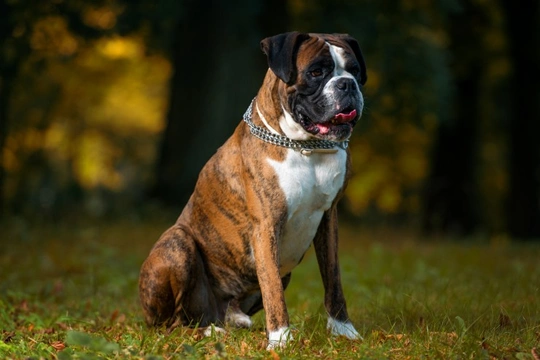
Tackling behavioural problems in the boxer dog
The boxer dog is a very distinctive looking breed of dog that is well loved and instantly recognisable in the UK, and the boxer is a popular pet for many reasons. They tend to be fun loving, loyal and affectionate, as well as kindly natured, full of beans and very entertaining to have around! The well trained and properly managed boxer dog is a pleasure to have around, but when they are young, getting things right and starting as you mean to go on can be a challenge!
Because the boxer can be prone to stubbornness and picking up bad habits without much encouragement, they can be challenging to tackle when it comes to behavioural issues, and so in this article we will look at some potential problems and how to manage them. Read on to learn more!
Aggression
The boxer dog might look like they are all business with a rather stern face, but they are actually generally very gentle, and make good family dogs, being loving and soulful and very tolerant of both kids and generally, other animals. However, like any breed of dog, the young boxer may potentially display aggressive or defensive-aggressive traits as the result of a lack of appropriate training when young, dominant behaviour or not enough socialisation.
Early training and good management that involves both ensuring that the boxer feels secure and safe in their home, and that they do not try to take the alpha role with the family are all vital to ensuring that the boxer does not become snappy or unreliable later in life.
Obsessive digging
Boxers are one breed that really like to dig! They may display this by digging up your flower beds or digging a the carpet and bedding within the home, and you may wish to provide your dog with an outlet for this by giving them their own area of the garden that they can destroy at will, leaving the rest of it alone!
Problem digging should be nipped in the bud early on, and this may mean that you will need to supervise and check your dog when they are out in the garden, both to prevent them from getting bored and to stop them finding their own entertainment!
If your dog is apt to dig under fences or walls, you may need to lay chicken wire under the foundations down to a couple of feet deep to stop them from doing this.
Inappropriate barking
The boxer is a fairly vocal dog, who will bark to tell you that someone is coming, in excitement, or if he wants to get your attention! They are good natural watchdogs that will alert you when someone is approaching, but they may also bark when bored or when you go out.
The key to reducing inappropriate barking in the boxer is to keep them occupied and ensure that they do not get bored, which means that you should spend plenty of time with them, and ensure that they are not left alone for too long. Lots of toys and things to do when they are on their own, and ensuring that they are walked and not full of beans before you leave them can all help.
Chewing
The boxer dog has a strong, powerful jaw that is just made for chewing, and they tend to retain this trait as they grow up, not limiting it to puppy teething! Without enough to occupy them, the boxer may well begin to chew up your furniture, carpets and anything else that they can get their teeth into, proving both problematic and expensive!
The key to managing chewing behaviour means taking a few different approaches simultaneously; ensure that your boxer is not left alone for so long that they get bored and start looking for things to do on their own, confine them to one room when you are out, and teach them about what objects and things are not theirs and should not be chewed. Diverting inappropriate chewing to something that they are allowed, like chew toys, also helps a lot.
A Kong toy stuffed with a few treats is a good way of keeping your boxer occupied and keeping their teeth busy when they need to be left alone!
Chasing
Boxers really are a lore unto themselves when it comes to chasing behaviour, and they can be very obsessive about it when they get going! While the breed can often live happily with cats, they do tend to like to chase things outside of the home, and ignore recall commands when they find themselves on the chase.
This is not always restricted to animals; some boxers become obsessed about other things, like wheels, and will take off after pushchairs, children on scooters and even bikes! This can of course be a huge problem and potential danger, so keeping your dog on the lead when around things that you know they will pursue, and working continually on their recall are all essential.



